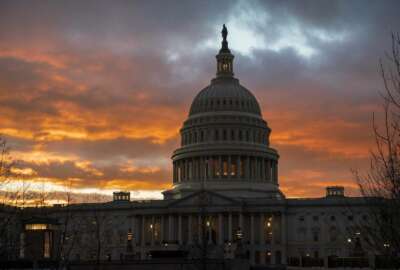Best listening experience is on Chrome, Firefox or Safari. Subscribe to Federal Drive’s daily audio interviews on Apple Podcasts or PodcastOne.
The House of Representatives Thursday afternoon cleared a seven-week continuing resolution, an important first step in Congress’ attempts to avoid another government shutdown at the fiscal year deadline.
The measure passed the House with a 301-123 vote.
The CR would fund agencies at 2019 levels through Nov. 21, buying lawmakers more time to negotiate over several full-year appropriations bills.
The Senate, which is expected to take up the continuing resolution next week, must pass some sort of short-term funding solution by Sept. 30.
Notably, the CR includes an additional $48 million for the Office of Personnel Management, which faces a funding shortfall on Oct. 1 when the National Background Investigations Bureau and the governmentwide security clearance portfolio transfers to the Pentagon.
The Trump administration has said the security clearance transfer will create a $70 million gap for OPM, which relied on the revenue it received by processing background investigations and other security credentials to fund other entities within the agency.
In addition, the CR gives OPM to authority to transfer roughly $29.7 million from “appropriate trust funds … without regard to any other provision of law” to maintain agency operations.
OPM administers health and retirement benefits to more than 2.7 million active employees and nearly 2.6 million annuitants, survivors and their family members through the Earned Benefits Trust Funds, which have close to $1 trillion in combined assets.
Former OPM officials, as well as former acting OPM Director and Office of Management and Budget Deputy Director for Management Margaret Weichert, have long questioned whether the agency could tap a greater portion of those trust funds to support the agency’s operations. This continuing resolution would allow OPM to do that up to a point.
The agency, however, still faces an uncertain future. Beyond OPM’s financial situation, the Trump administration has cited poor IT systems and strategic and operational weaknesses as reasons for the proposed merger of the agency with the General Services Administration.
Weichert, who has been spearheading the OPM-GSA merger, said back in July OMB would ask Congress for an OPM budget anomaly in a 2020 continuing resolution. She said she saw promising signs of support from Congress on the merger.
Still, both chambers of Congress don’t appear ready to embrace the administration’s proposed OPM-GSA merger just yet.
The Senate Appropriations Committee on Thursday morning cleared an additional $43 million for OPM next year. The extra funding is part of the 2020 financial services and general government appropriations bill and matches a proposal in the House-passed version of this bill.
The Senate bill is also silent on federal pay for 2020, meaning congressional leadership will need to conference over exactly how much of a raise civilian employees will receive next year.
The House cleared a 3.1% federal pay raise in its version of the financial services bill.
At least member of the Senate said he would push for the House’s proposal in an upcoming conference with congressional leadership.
“Our hardworking civil servants are the backbone of the federal government and serve the American people every day; refusing to pay them what they deserve is shameful,” Sen. Chris Van Hollen (D-Md.), a member of the appropriations committee, said in a statement to Federal News Network. “I worked to stop President Trump’s earlier call for a pay freeze, which he is no longer threatening, and I will strongly support the House’s 3.1% pay raise in conference. I am also pleased that the legislation funds OPM as its own entity, not as part of GSA. This legislation rejects that misguided idea, and I will continue to fight it.”
Federal employee unions and organizations are also pushing for the 3.1% federal pay raise, which would match the planned increase for members of the military.
“Federal employees are certainly pleased to have so much strong bipartisan support for a pay increase in 2020, which is better than the pay freeze proposals they’ve faced recently,” Tony Reardon, president of the National Treasury Employees Union, said in a statement. “But locality pay is crucial to the government’s ability to recruit and retain skilled workers in high-cost areas around the country, which is why we continue to urge lawmakers to settle on the 3.1% proposal.”
The Senate Appropriations Committee also passed two other appropriations measures Thursday, one on agriculture, rural development and food and drug administration and the other on transportation and housing and urban development.
The agriculture bill includes $25 million to support the Agriculture Department’s planned relocation of the Economic Research Service and National Institute of Food and Agriculture to Kansas City.
The full Senate has yet to take up a single appropriations bill. The House has passed 10 of 12 spending measures earlier this summer. Lawmakers seemed relatively confident a seven-week CR would give them enough time to finish a longer term funding deal.
“There was some discussion about going into the middle of December,” House Majority Leader Steny Hoyer (D-Md.) said Thursday from the floor. “There is no reason in God’s green Earth we cannot complete our business on the appropriations process by Nov. 21. Not a single reason.”
Copyright
© 2024 Federal News Network. All rights reserved. This website is not intended for users located within the European Economic Area.
